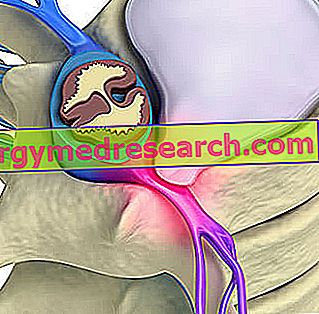NORMIX ® is a rifaximin drug
THERAPEUTIC GROUP: Antibiotic - Intestinal antimicrobial
IndicationsAction mechanismStudies and clinical effectiveness Usage and dosage instructionsWarnings Pregnancy and lactationInteractionsContraindicationsUndesirable effects
Indications NORMIX ® Rifaximin
NORMIX ® is used in the antimicrobial treatment of intestinal infections supported by Gram + and Gram bacteria - with relative diarrheal symptoms, in the treatment of diarrheal manifestations associated with altered intestinal flora and in the prevention of infectious complications associated with surgical operations.
NORMIX ® is also indicated as an adjunct in the treatment of hyperammonemia.
Mechanism of action NORMIX ® Rifaximin
Rifaximin, the active ingredient of NORMIX ® is an antibiotic belonging to the rifamycin family, particularly indicated for the treatment of intestinal microbial infections, given its poor systemic absorption, estimated at a maximum of around 1%.
This important pharmacokinetic property allows the aforementioned antibiotic to reach the intestinal tract at high concentrations, to exercise the therapeutic action directly in situ, minimizing the work of the excretory organs and excretory organs in metabolizing it.
The wide spectrum of action, which makes rifaximin indicated both in the treatment of Gram + and Gram - infections, is justified by the mechanism with which it acts, characterized by the ability to block the bacterial DNA transcription process, through the inhibition of the enzyme RNA polymerase.
Studies carried out and clinical efficacy
1. RIFAXIMINA AND IRRITABLE COLONY SYNDROME
All-Italian study, which investigates the possible causes and remedies of irritable bowel syndrome. In particular, emphasis is placed on the increased intestinal bacterial growth, which, diagnosed with lactulose breath test, and treated with rifaximin, proved to be an important cause of the aforementioned pathology. It therefore becomes important to consider, at least in the Italian population, the possible bacterial growth as the cause of irritable bowel syndrome, and the administration of rifaximin as a possible therapeutic approach.
2. RIFAXIMINA AND TREATMENT OF ACUTE DIARRHEA
Acute diarrhea is often associated with bacterial infections of various kinds. For years the treatment with ciprofloxacin has been one of the most used therapeutic choices, so as to create a high number of particularly resistant bacterial strains. In this randomized study it was noted that rifaximin may be more effective than ciprofloxacin in ensuring a remission of the disease, improving symptomatology in 78% of treated cases and restoring proper intestinal health in 57% of patients, values significantly higher than those registered with ciprofloxacin.
3. RIFAXIMINA AND ABDOMINAL PAIN IN PEDIATRIC AGE
Abdominal pain in children is often related to intestinal bacterial hyperproliferation, which is a potential risk factor for the onset of irritable bowel syndrome. Although the various studies support the efficacy of rifaximin therapy in resolving excessive intestinal bacterial growth in irritable bowel syndrome, this study instead demonstrates the poor resolving capacity of the same therapy in children with intense abdominal pain and a positive lactulose test ( diagnostic index of excessive bacterial growth).
Method of use and dosage
NORMIX ® 200 mg coated tablets of rafaximin or granules for oral suspension 2gr of rifaximin every 100 ml:
the usable dosage varies according to the therapeutic indications.
More precisely, in the treatment of diarrhea associated with bacterial infections, the dose of 200 mg of rifaximin (equal to 1 tablet or 10 ml of oral suspension) every six hours seems to be particularly effective, while that of 400 mg every 12 hours is indicated in the Pre-and post-operative infection prevention which can be administered every 8 hours in the treatment of hyperammonemia.
Antibiotic therapy should be prolonged for at least 7 days, under strict medical supervision.
The dosage necessarily undergoes major corrections in the case of pediatric patients.
Warnings NORMIX ® Rifaximin
The presence of intestinal lesions could determine a significant increase in the systemic absorption of rifaximin, altering the normal pharmacokinetic properties of the active ingredient.
In these cases the appearance of reddish urine, are to be associated with the characteristic coloring of the drug, which is evidently excreted through the urine, without any kind of clinical correlation.
It has been described several times, the presence of bacterial strains resistant to NORMIX ® therapy for which it would be necessary to change the choice of antibiotic towards a more effective and active one.
Among the excipients contained in the oral suspension of NORMIX ® it is possible to detect the presence of sucrose, which could be associated with the appearance of side effects in patients suffering from fructose intolerance and from glucose-galactose malabsorption.
The presence of dizziness and headache, associated with the use of rifaximin, could make driving cars and the use of machinery dangerous.
PREGNANCY AND BREASTFEEDING
At the moment there are no studies able to characterize the safety profile of rifaximin on the health of the fetus when taken during pregnancy, let alone the pharmacokinetic characteristics (secretion in breast milk).
Therefore the intake of NORMIX ® should be limited during pregnancy and lactation to cases of real need and under strict medical supervision.
Interactions
The low level of systemic absorption of rifaximin significantly reduces all possible interactions with other active ingredients, making NORMIX ® administration quite stable from a pharmacokinetic point of view
Although the low proportion of antibiotics absorbed is partly metabolized by the cytochrome p 450 enzyme system, no clinically significant pharmacokinetic alterations were observed.
Contraindications NORMIX ® Rifaximin
NORMIX ® is contraindicated in patients with established hypersensitivity to rifaximin or other active ingredients belonging to the same chemical class and with intestinal pathologies such as partial obstructions and ulcerative intestinal lesion.
Undesirable effects - Side effects
Although NORMIX ® therapy proved to be well tolerated by post-marketing experience, different clinical trials have highlighted the presence of fairly common side effects such as: dizziness, headache, abdominal pain, constipation, diarrhea, flatulence, nausea, vomiting, fever, rash and allergic manifestations.
More rare were disorders affecting the vascular system, hepatobiliary, skeletal muscle, renal and cutaneous, in any case clinically irrelevant and completely transient.
Note
NORMIX ® is a medicine that can be sold under prescription.



